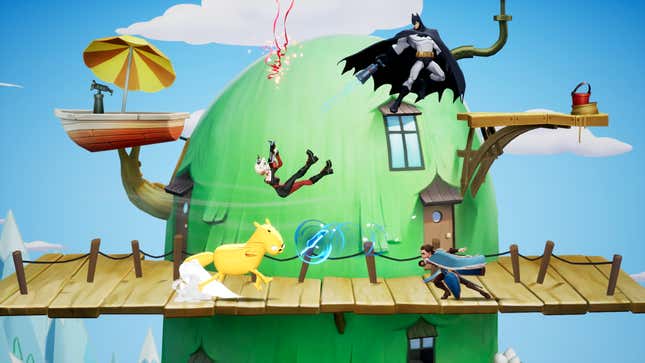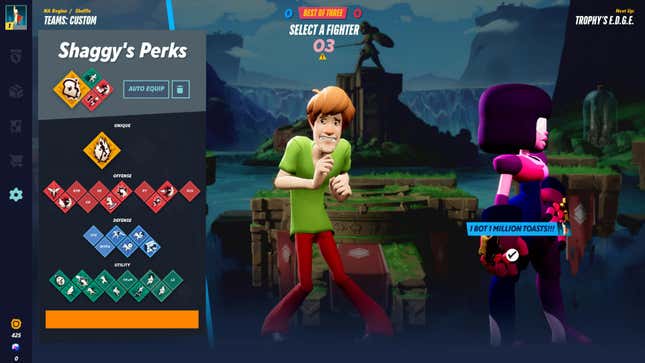Sometimes when I sit down to play MultiVersus, it kinda feels like I’m a child reaching into a cookie jar. Part of me knows, if I want to be a good boy, I shouldn’t be doing it. But cookies taste good as hell. That rush of mind-melting bliss when biting into a gooey, sugary treat easily overtakes the ethical considerations of disobeying my parents. Similarly, diving into MultiVersus’ colorful world of competitive chaos and cartoon charm is as novel and gratifying as ever. But all that joy is propped up by a dumpster fire full of free-to-play, service gaming tropes, some so poorly thought out or predatory that it’s shocking they made it out the gate at all. Having to qualify a good time with a bold asterisk of caveats is the MultiVersus experience.
First, the basics: MultiVersus is a “platform fighter,” which basically means it’s a derivative work of the Smash Bros. style and structure. It’s also a massive IP crossover, with a roster full of hits from cartoons, movies, and shows under the Warner Bros. umbrella. There’s no holding back in terms of worrying what source material children may be exposed to for the first time either, with Friday the 13th’s Jason Voorhees and Game of Thrones’ Arya Stark in the mix right alongside characters from Scooby-Doo and Adventure Time. It’s one of the best of its kind as well, with a rock-solid foundation combining the party game chaos this genre is known for with a surprisingly serious interest in the language and cadence of a capital-F Fighting game.
In the hands of developer Player First Games, that combo works quite well. Each character has a lengthy and creative move set full of distinct, IP-flavored properties alongside more common video game elements such as “cold things make you slow.” Looking at command lists is almost daunting in a MOBA kind of way, but in practice the basics are so rock-solid and uncomplicated that you can ignore the nuance and still have a great time. Between the stuff that’s obviously taken from Smash and the little dashes of extras and new ideas, MultiVersus makes an incredible first impression. From a gameplay perspective, anyway. When you boot the game up, the menus and UI begin to tell a different story entirely.
This could have been a heck of a comeback story. MultiVersus originally came out in 2022 as an “Open Beta,” inviting players to try the game out and maybe drop some dollars to become “Founders” in exchange for some goodies. Despite general aversion to “GaaS” models and feelings that there was something a bit cynical about Warner Bros. just tossing a bunch of the IPs it’s accumulated into a crossover fighter, it seemed like MultiVersus was a hit. Between a strong debut tournament at EVO, surprisingly compelling vibes and mechanics, and shocking player numbers, the momentum was stronger than anyone expected.

Unfortunately it wasn’t long before MultiVersus started buckling under its own weight. Player First is a small team saddled with an enormous task. The game was plagued with technical issues and balancing problems that only became more evident as more people dug in. Fixes made other problems pop up, and it felt like there was always something wrong, from overpowered characters to devastating fundamental flaws.
To PFG’s credit, these folks did an absurd amount of work in record time, even completely overhauling how hitboxes worked. At the same time, that work had to be funded somehow, and the microtransactions, seasonal content, and so on were also implemented during this “Open Beta” run. This stuff came with its own set of problems, as PFG grappled with reward allotments, Battle Pass XP scaling, event timing, yadda yadda. A lot of real-time learning was happening, to say the least.
Then MultiVersus was unexpectedly shut down. The “Open Beta” period had ended, the feedback was collected, and the devs needed to go head down for a while to come back with the best game they could make for 1.0. This came as a surprise for many; most players expected the Open Beta to simply roll into 1.0, as is often the case in similar service games, especially since a lot of money had already changed hands, as players bought Founder packs, skins, multiple Battle Passes, and more. That brings us to today. MultiVersus 1.0 arrived a few weeks ago, and I wanted to take my time with it, being sure that I was giving PFG a fair shake, as well as time to smooth out bugs, and maybe also Bugs if he came out too strong again. Given how strong its foundations are, I was really hoping for this game to get a win after so much turbulence. Unfortunately, though, it hasn’t quite worked out that way.
Throughout these first few weeks following 1.0’s release, MultiVersus has once again been a solid game plagued by problems. Bafflingly, some of those problems were repeats from before, such as a very deja vu-inducing lack of Battle Pass XP from playing matches, as well as XP being added but at an insultingly low rate. There were important features and options, including accessibility-oriented settings, that were just absent for no reason. Perhaps the loudest and strangest omission was one that immediately made MultiVersus’ strong community prospects look dire.
All of this stuff has been addressed or is confirmed to be addressed soon, following days of yelling or pleading from players in some cases. The messaging has been rough, with nobody actually knowing if some of these changes, omissions, or alleged bugs were on purpose or not until after the reactions were creating headlines and viral social media posts. It’s hard to undo that kind of damage.
Which is a shame, because MultiVersus remains a blast to play, especially after an initial round of patches and hotfixes. It’s a slower game than before, with a ton of effort put into making the action more reactive and visually digestible. The characters are a little larger, and the camera is more zoomed in. Additional animation work has been done to make hit detection more legible, and the end result of all this is a platform fighter that feels informed by “normal” fighting game logic in many ways. Spacing, reacting, reading, punishing, zoning, footsies…all these keywords are more pronounced in MultiVersus 1.0.
To me, this is a substantial improvement across the board. I understand some of the negative reaction to the slower pace, but speed isn’t an inherent plus for fighters. I may be exposing myself as someone who prefers Street Fighter, but having the breathing space to think more heavily about what I’m doing, and what my opponent is doing, feels better. And having that kind of mentality in a platform fighter feels distinct. Plus, it really helps the style coursing through every element of MultiVersus really shine.

One thing that hasn’t changed from the Open Beta to now is MultiVersus’ radiating passion for the characters and properties it pulls from. While you can’t argue that this game has anywhere near the same polish or production value as Smash Bros., the amount of creativity, effort, and love put into molding these characters into a coherent fighting game universe is very close. My favorite example is Tom and Jerry, a pair of troublemakers who are living out an episode of their cartoon show instead of actively participating in combat. Jason Voorhees, a new example, has been presented in a new way visually, but has iconic movie moments built into his moveset. The Looney Tunes energy and reality-breaking toon lunacy is all over the place, even beyond the characters. This is the secret sauce MultiVersus is operating with, and a huge part of what makes the game feel special compared to its peers, despite its glaring problems and GaaS failings.
The new Rifts mode encapsulates that tug-of-war between the secret sauce and the corporatized, free-to-play gaming nonsense. MultiVersus needed a campaign-style mode for non-competitive players. This is that, and in a lot of ways it feels similar to a classic Smash Bros. mode. You make your way through stages that are themed, with specific opponents that have various buffs or other unusual gameplay gimmicks to break up the normal. There are goofy challenges like breaking targets, or a jump rope minigame that simpy exists to highlight the absurdity.
But of course, there’s a moment when the monkey’s paw curls a finger. Rifts have a “Gems” system woven in that asks players to equip these collectibles rewarding stat bonuses and extra buffs. Playing higher difficulties requires grinding the everloving bejeezus out of these Gems, and that’s just to get the doors to open. Succeeding requires further grinding, and even participating in some of the stage objectives (necessary to unlock more Gems) can require things like specific characters or even premium skins in some cases.
Currently, one of the new characters (Agent Smith of The Matrix) can be unlocked early, but it requires defeating 20 distinct bosses, something that can only be accomplished by going through multiple Rifts and multiple difficulty levels. The Rifts are still being rolled out, and it’s not actually possible to get Smith yet, but the prospect of staring down a sort of miniature Battle Pass that asks you to turn the silly campaign mode into a second job is exhausting. But hey, you can just wait a few weeks and pay up your real money if you don’t want to deal with all this!
Enjoying MultiVersus is a series of “yeah, but”s. It launched in poor shape with missing features and settings. Yeah, but it’s a fun, well-designed game that is full of tangible passion. There’s an absurd amount of grinding and pressure to spend money, even incorporated into the campaign mode. Yeah, but it’s a fun campaign with a lot of funny gimmicks and co-op! The roster is big and the new characters are great! Yeah, but you’re expected to grind daily or pony up chunks of cash to actually use them.
It’s the cookie jar. I want to play and praise MultiVersus for everything it does right. But everything it does poorly, or even wrong in a sense, has me wanting to slap my own wrist. MultiVersus has even managed to bungle those aspects of the games-as-a-service model that players have largely come to accept. There has been some course-correcting since launch, but the fact that was even necessary only shows how some forces behind these kinds of games are always ready to push the boundaries on monetization. It feels wrong, ethically, to participate in, and especially to recommend this game to others. But at the same time, it’s so good! Not even in the skinner box kind of way; MultiVersus is a legitimately well-made and lovingly constructed platform fighter that celebrates cartoons and movies I enjoy in effective, gameplay-centric ways. Rick and Morty are there too, I guess.
MultiVersus is great. But I wouldn’t feel good about letting my own kid play it. That sucks.
.


